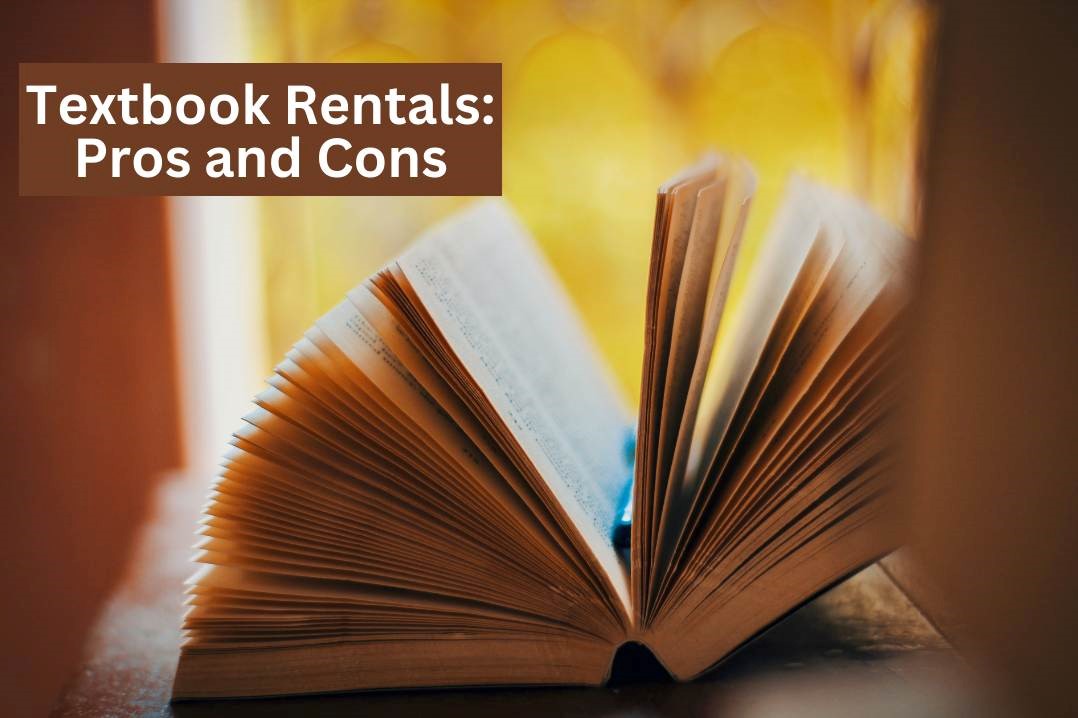Textbook costs can be a major financial burden for students, especially when you have to buy a whole new set of books every semester. That is where textbook rentals come in. Textbook rentals allow you to rent your textbooks for a fraction of the purchase price and then return them at the end of the semester. This can be a wonderful way to save money on textbooks, but there are also some potential drawbacks to consider.
Pros of Textbook Rentals
- Cost Savings:
Textbook rentals can significantly alleviate the financial burden on students. They are typically much more affordable than purchasing new textbooks, often enabling you to save up to 50% or more on textbook costs. This cost-effective approach to acquiring course materials can make higher education more accessible.
- Convenience:
Renting textbooks is exceptionally convenient. You can effortlessly find and rent textbooks online, and they can be delivered directly to your doorstep. When the semester concludes, returning them is equally hassle-free, whether through the mail or at a designated drop-off location. This convenience streamlines the process of obtaining and returning course materials, allowing you to focus on your studies.
- Financial Flexibility:
Textbook rentals offer financial flexibility, allowing you to pay only for the duration you require the book. Whether you need it for the entire semester or just a few weeks or months, you can customize the rental period to align with your specific course requirements. This adaptability empowers students to manage their expenses more effectively, paying only for what they need and when they need it.
- No Resale Hassles:
With rented textbooks, you can sidestep the challenges of reselling books at the end of the semester. You will not need to search for buyers, worry about the depreciation in the book's value, or deal with the uncertainty of finding someone willing to purchase it. This eliminates a time-consuming and sometimes frustrating aspect of managing your course materials.
- Updated Materials:
Rental textbooks are typically well-maintained and up to date. You are more likely to receive a clean, unmarked, and current edition of the book, which can be highly beneficial for your studies. Using an updated textbook ensures that you have access to the latest information, research, and insights, which is particularly important in fast-evolving fields of study.
- Environmental Impact:
Renting textbooks can be an environmentally friendly choice. By reducing the demand for new printed materials, it aligns with sustainability goals and contributes to the reduction of paper waste. This is a responsible choice for students who are conscious of their environmental impact and want to contribute to a greener, more sustainable future.
- Access to Expensive Textbooks:
Access to academic textbooks can be expensive, especially when dealing with specialized subjects or limited print runs. Textbook rentals provide a cost-effective solution, allowing students to access these expensive materials without the financial burden of purchasing them outright. This accessibility opens up educational opportunities for a broader range of students.
- Reduced Clutter:
The accumulation of textbooks can lead to clutter in your living space, particularly in your study area or dorm room. Textbook rentals eliminate the need to store numerous books, helping you maintain an organized and tidy environment. This promotes a conducive atmosphere for studying and reduces the distractions caused by a cluttered space.
- No Depreciation:
The value of purchased textbooks typically decreases over time, especially when new editions are released. With textbook rentals, you do not need to worry about the depreciation of your investment. At the end of your course, you simply return the book, and there is no concern about the book's resale value or its long-term financial impact.
- Exploration of Learning Resources:
Textbook rentals offer an opportunity to explore different textbooks for the same course without the commitment of a purchase. This can be highly beneficial if you wish to compare different teaching styles, approaches, or perspectives on a subject. It encourages a more comprehensive and well-rounded learning experience, allowing you to select the resource that best suits your needs.
- No Shipping Cost:
When you purchase textbooks online, you often incur shipping costs, and textbooks can be heavy, adding to the overall expenses and logistical challenges. With textbook rentals, the cost of shipping is often included in the rental fee, saving you money, and eliminating the inconvenience of handling heavy packages.
- Flexibility for Elective Courses:
For elective courses that you may not have a long-term interest in, renting textbooks is a practical choice. It allows you to access the required materials for a specific semester without the commitment of keeping the book indefinitely. This flexibility is especially valuable for courses that are not part of your long-term academic focus.
Cons of Textbook Rentals
- Limited Ownership:
When you rent a textbook, you are essentially borrowing it for a specific period. This lack of ownership means you cannot keep the book for future reference, creating a potential drawback if you are building a personal reference library or anticipate needing the material for later courses. Having your own collection of textbooks allows for long-term access and learning.
- Late Fees:
Many rental services impose late fees if you fail to return the textbook by the specified due date. These fees can accrue rapidly, eroding the initial cost savings of renting. Timely returns are crucial to avoid these financial penalties, which can add stress to an already busy academic schedule.
- Highlighting and Note Restrictions:
Rental companies frequently set limits on the amount of highlighting and note-taking you can do in rented textbooks. These restrictions can be frustrating for students who rely on annotations for studying and comprehension. Your ability to personalize the text to suit your learning style is curtailed.
- Damage Charges:
Rental companies may charge for any damage that goes beyond normal wear and tear. This includes issues like water damage, torn pages, or excessive writing or highlighting in the book. These charges can increase the overall cost of renting, potentially making it more expensive than purchasing a new book eventually.
- Limited Availability:
Not all textbooks are available for rent, and sometimes rental companies may not offer the current edition of a book or may not have the book at all. This limitation can be a significant obstacle for students in specialized or less common courses, leaving them with no choice but to purchase the book.
- Incompatibility with E-Readers:
While some rental platforms offer digital textbooks, not all students prefer e-books. For those who favor physical copies, this creates a challenge as it might not be an option for them, making renting a physical book a more appealing choice.
- No Resale Potential:
When you purchase a textbook, you have the option to sell it after the course ends, recouping some of your expenses. With rentals, you cannot benefit from resale, which can be a disadvantage for students who wish to recover a portion of their textbook expenses.
- Limited Shelf Life:
Textbook rentals come with a specific rental period that may not align with your study needs. If you anticipate needing the material beyond this period, you will have to renew the rental (incurring additional costs) or find alternative resources, which can be inconvenient and costly in the long term.
- Ownership Preference:
Many students prefer owning their textbooks for the flexibility to annotate, mark, and highlight the material as they wish. With rented textbooks, you are obliged to follow restrictions on customization, which can be limiting for personalized study approaches.
- Availability of Supplemental Materials:
Textbook rentals often do not include access to digital codes, online resources, or study guides that are typically bundled with new textbooks. These supplementary materials can be essential for some courses, and their absence can hinder your learning experience.
- Quality Concerns:
While rental textbooks are usually in good condition, there is always a risk of receiving a book with excessive wear and tear, markings, or missing pages. It is vital to check the condition of your rented book upon receipt to ensure it meets your academic requirements.
- Uncertain Return Process:
Returning rented textbooks at the end of the semester can be stressful, particularly if you have concerns about the book's condition and whether it meets the rental company's criteria for "normal wear and tear." This process can be time-consuming and may involve additional charges if the book is considered damaged.
- Change in Course Requirements:
Course instructors have the authority to switch textbooks or editions between semesters to stay current with developments in the field. For students renting books, this can be problematic, as they can't keep the book for future courses that may require the updated material. In such cases, you may have to rent the latest version or purchase it, incurring additional expenses.
In light of these potential drawbacks, students should carefully evaluate their unique learning preferences, course requirements, and long-term academic goals when making a decision about textbook rentals versus purchases. Balancing these factors can help you make an informed choice that aligns with your academic journey.
Final words
Textbook rentals can be a fantastic way to save money on textbooks, especially for students on a tight budget. However, it is important to consider the limitations, such as the limited selection of books, rental terms, and the inability to resell the books. Be sure to compare the pros and cons carefully before deciding whether or not to rent your textbooks, as the right choice may vary depending on your specific circumstances and academic needs.
FAQs
- Are rental textbooks in good condition?
Yes, rental textbooks are generally in good condition. Rental companies make efforts to ensure that the books are well-maintained. Before renting, it is good practice to check the condition of the book to confirm that it meets your standards. Most rental companies offer descriptions of the book's condition to help you assess its state.
- How do I return a rented textbook?
Returning a rented textbook is typically straightforward. Most rental companies provide a prepaid shipping label for you to send the book back via mail. Some may also have drop-off locations on campus or in partnership with local stores. Be sure to return the book by the specified due date to avoid late fees.
- Can I highlight or write in a rented textbook?
Many rental companies allow some degree of highlighting and note-taking in rented textbooks, but there may be restrictions. It is essential to follow the company's guidelines to avoid damage charges. In most cases, gentle highlighting and erasable notes are acceptable, but extensive markings might incur additional costs.
- What if I lose a rented textbook?
If you lose a rented textbook, you are likely to be charged for the cost of the book. This can be quite high, so it is crucial to keep track of your rented books and take steps to avoid losing them. Some rental companies offer optional insurance that can help cover the cost of replacement in case of loss.
- Can I renew a textbook rental if I need it for a longer period?
Yes, many rental companies offer the option to renew a textbook rental if you need it for a more extended period. This can be a practical solution if your academic needs extend beyond the original rental period. Keep in mind that renewals often come with an additional fee, so it is an innovative idea to plan in advance.









